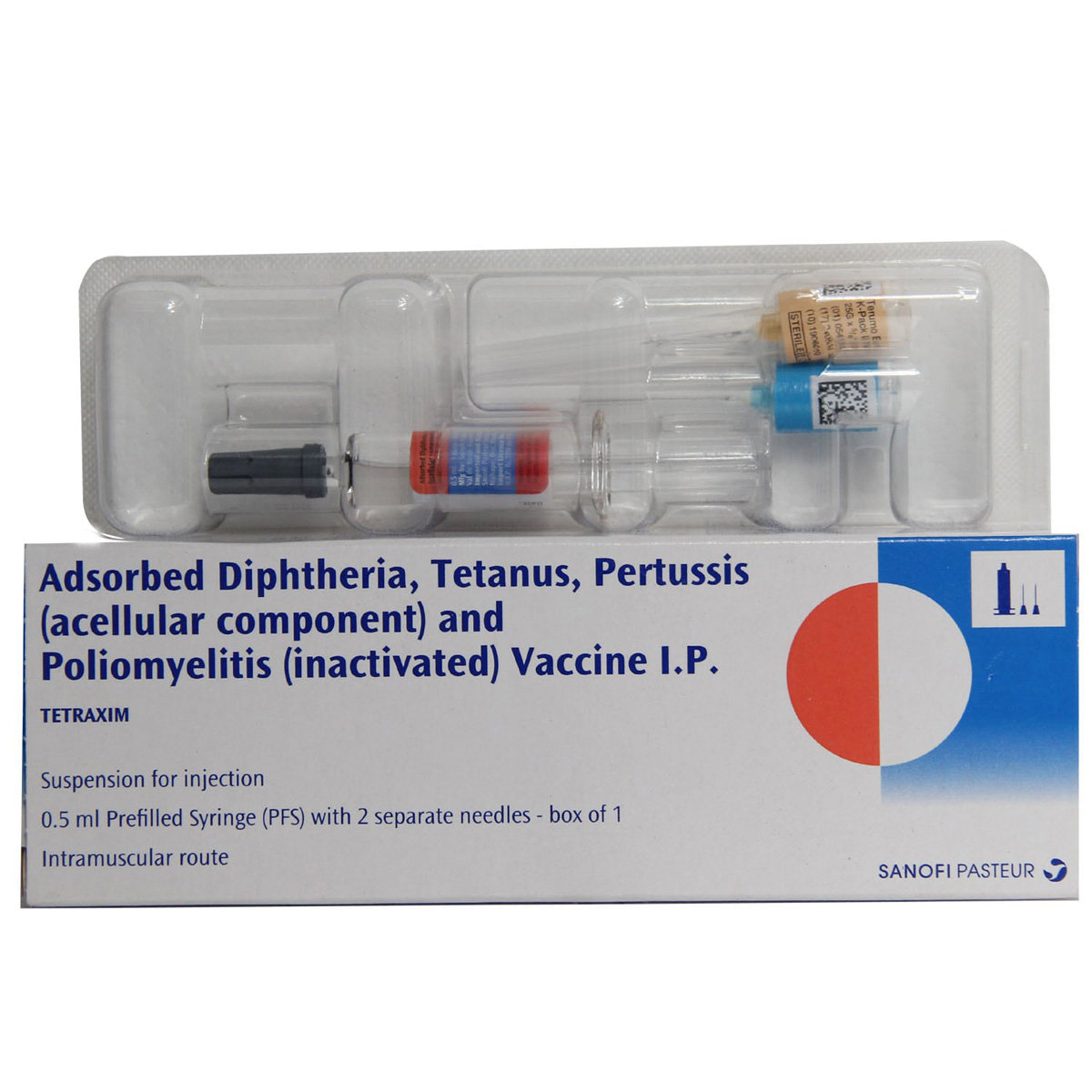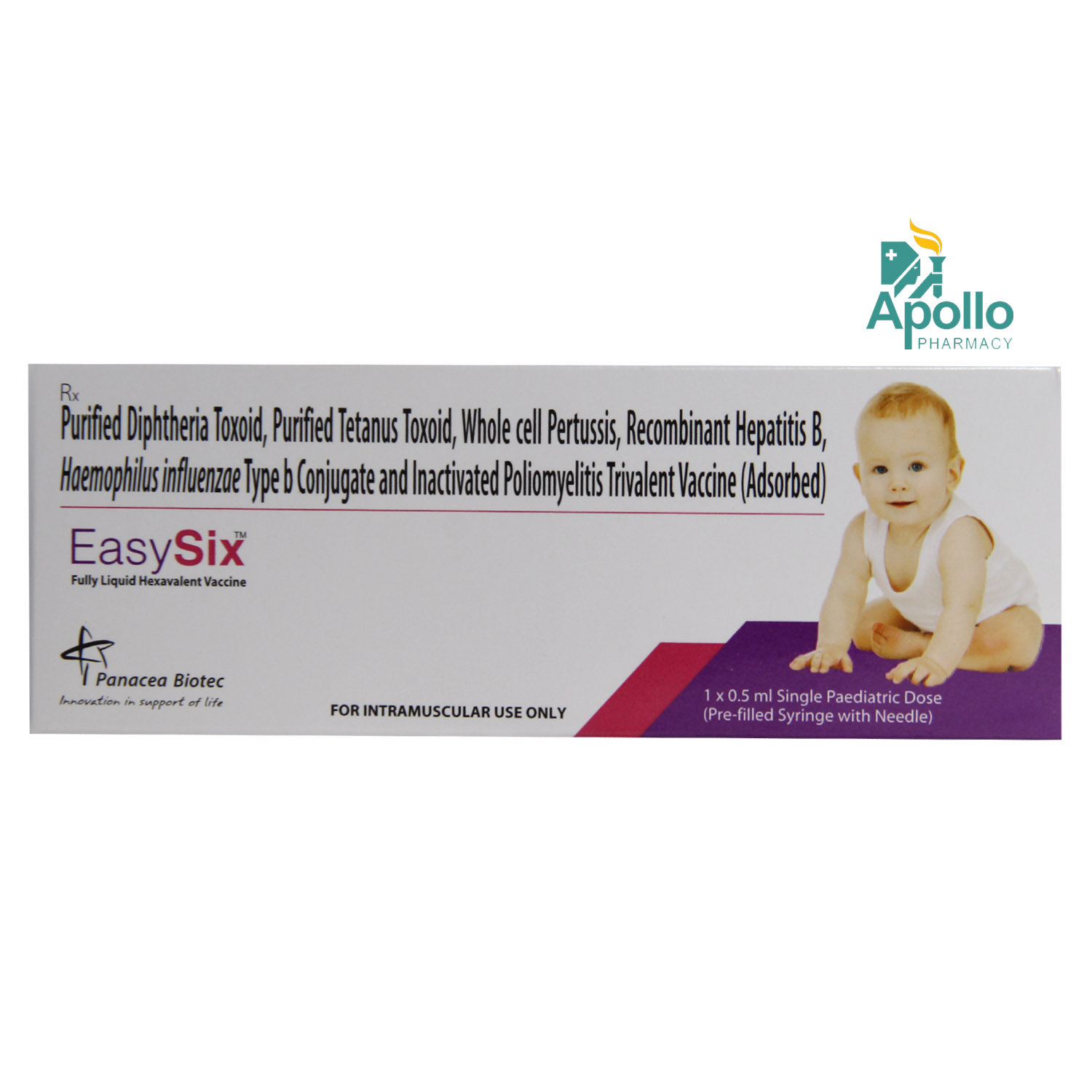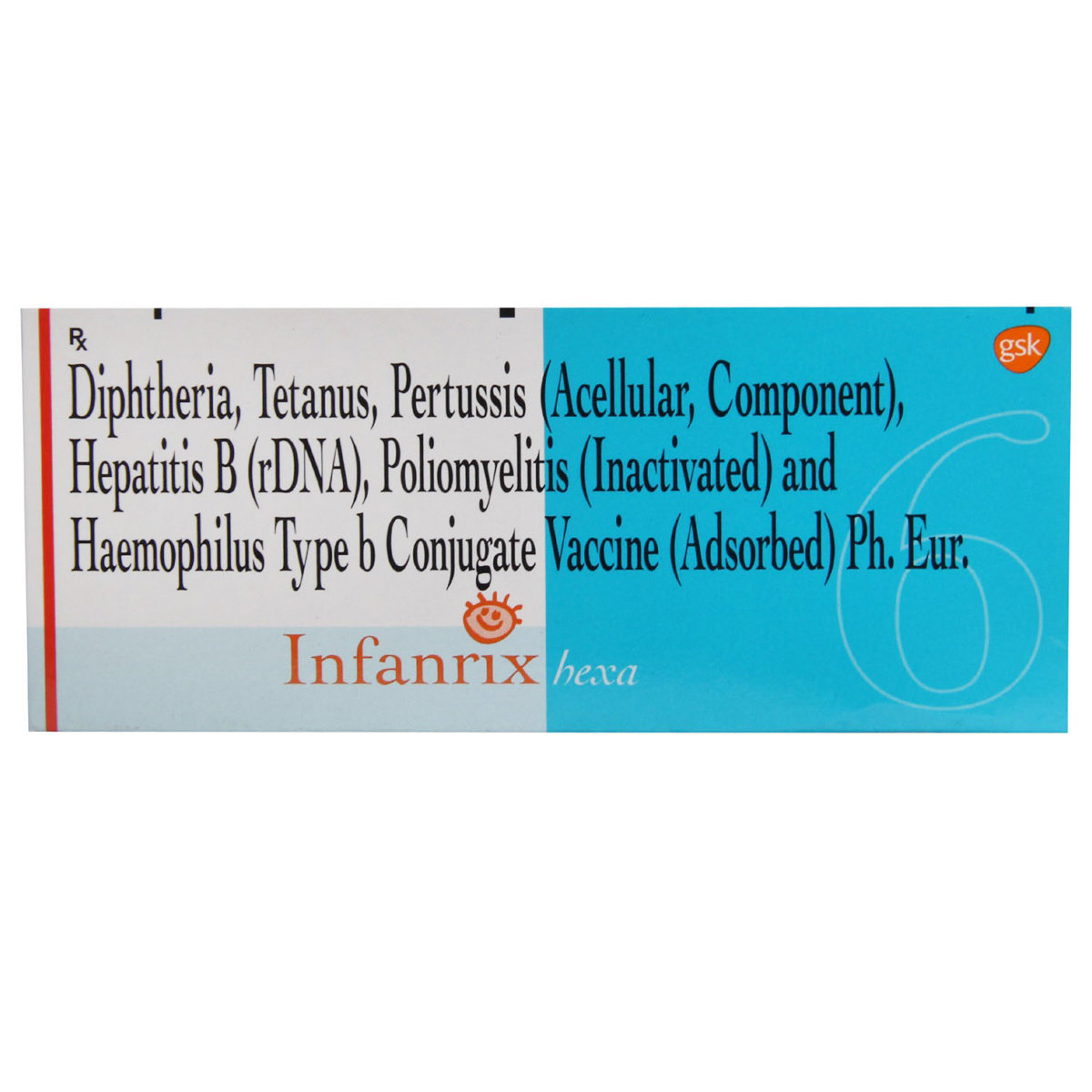Diphtheria Toxoid+pertussis Toxoid+poliomyelitis Virus Antigen Unit+tetanus Toxoid
About Diphtheria Toxoid+pertussis Toxoid+poliomyelitis Virus Antigen Unit+tetanus Toxoid
Diphtheria Toxoid+pertussis Toxoid+poliomyelitis Virus Antigen Unit+tetanus Toxoid belongs to the group of medicines called 'immunizing agents' primarily used to prevent four serious diseases, diphtheria, tetanus, pertussis, and poliomyelitis. Diphtheria, tetanus, pertussis, and poliomyelitis are serious bacterial and viral infections. Diphtheria affects the throat and nose, causing respiratory issues. Tetanus causes muscle stiffness and spasms through contaminated wounds. Pertussis, or whooping cough, leads to severe coughing fits and breathing difficulties. Poliomyelitis can cause paralysis, muscle weakness, and permanent disability.
Diphtheria Toxoid+pertussis Toxoid+poliomyelitis Virus Antigen Unit+tetanus Toxoid contains inactivated toxins (toxoids) and antigens from four serious diseases, diphtheria toxoid, pertussis toxoid, poliovirus antigen unit, and tetanus toxoid. It works by stimulating the immune system to recognize and fight four serious diseases, diphtheria, tetanus, pertussis, and poliomyelitis. It introduces the body to inactivated toxins (toxoids) and antigens from these diseases, triggering the production of antibodies to neutralize toxins and fight infections. This enables the immune system to build a defense against these serious diseases, providing immunity and protecting against future infections.
Diphtheria Toxoid+pertussis Toxoid+poliomyelitis Virus Antigen Unit+tetanus Toxoid will be administered by a healthcare professional. Common side effects of Diphtheria Toxoid+pertussis Toxoid+poliomyelitis Virus Antigen Unit+tetanus Toxoid may include loss of appetite, feeling nervous or irritable, crying more than usual, feeling sleepy, headache, vomiting, muscle pain, fever, and feeling unwell. These side effects are not familiar to everyone and vary individually. If your child experiences any side effects that are not manageable, please consult your doctor.
Inform your doctor before taking Diphtheria Toxoid+pertussis Toxoid+poliomyelitis Virus Antigen Unit+tetanus Toxoid if your child has had a history of Guillain-Barré syndrome, brachial neuritis, febrile convulsions, afebrile convulsions, thrombocytopenia, bleeding disorders, or edematous reactions after vaccination. Also, if your child has chronic immunodeficiency, such as HIV infection, or is undergoing immunosuppressive treatment. Additionally, if your child is a premature infant (born ≤ 28 weeks of gestation) with a history of respiratory immaturity.
Uses of Diphtheria Toxoid+pertussis Toxoid+poliomyelitis Virus Antigen Unit+tetanus Toxoid
Medicinal Benefits
The medicinal benefits of Diphtheria Toxoid+pertussis Toxoid+poliomyelitis Virus Antigen Unit+tetanus Toxoid include protection against diphtheria, prevention of pertussis (whooping cough), immunity against poliomyelitis (polio), and protection against tetanus. This combination vaccine prevents serious complications such as respiratory and cardiac issues, severe coughing fits, paralysis, muscle weakness, and disability, ultimately reducing the risk of hospitalization and death.
Directions for Use
- Follow your doctor's instructions on the dosage and timing of this medication to ensure safe and effective use.
- Diphtheria Toxoid+pertussis Toxoid+poliomyelitis Virus Antigen Unit+tetanus Toxoid will be administered by a healthcare professional in a medical setting.
- Do not self-administer.
Storage
Side Effects of Diphtheria Toxoid+pertussis Toxoid+poliomyelitis Virus Antigen Unit+tetanus Toxoid
- Loss of appetite
- Feeling nervous or irritable
- Unusual crying
- Feeling sleepy
- Headache
- Vomiting
- Muscle pain
- Redness, pain, or swelling at the injection site
- Fever
- Feeling unwell
- Trouble sleeping
- Diarrhea
- Hardness at the injection site
Drug Warnings
Do not give Diphtheria Toxoid+pertussis Toxoid+poliomyelitis Virus Antigen Unit+tetanus Toxoid to your child if they have a history of hypersensitivity to any component of the vaccine, experienced a severe allergic reaction to a previous dose, or have encephalopathy (brain disease) of unknown cause within 7 days of vaccination. Inform your doctor before taking Diphtheria Toxoid+pertussis Toxoid+poliomyelitis Virus Antigen Unit+tetanus Toxoid if your child has had a history of Guillain-Barré syndrome, brachial neuritis, febrile convulsions, afebrile convulsions, thrombocytopenia, bleeding disorders, or edematous reactions after vaccination. Also, if your child has chronic immunodeficiency, such as HIV infection, or is undergoing immunosuppressive treatment. Additionally, if your child is a premature infant (born ≤ 28 weeks of gestation) with a history of respiratory immaturity. Store Diphtheria Toxoid+pertussis Toxoid+poliomyelitis Virus Antigen Unit+tetanus Toxoid in cold places at 2°C to 8°C and do not freeze.
Drug Interactions
Drug-Drug Interaction: The effectiveness of Diphtheria Toxoid+pertussis Toxoid+poliomyelitis Virus Antigen Unit+tetanus Toxoid may be decreased if taken with corticosteroids (hydrocortisone, fludrocortisone) or immunosuppressants (basiliximab, cyclosporine, tacrolimus, mycophenolate mofetil).
Drug-Food Interaction: No major interactions were found or established.
Drug-Disease Interaction: Before administering Diphtheria Toxoid+pertussis Toxoid+poliomyelitis Virus Antigen Unit+tetanus Toxoid, inform your doctor if your child has a history of hypersensitivity, allergic reactions, encephalopathy, Guillain-Barré syndrome, bleeding disorders, or immunodeficiency conditions, such as HIV infection, or is undergoing immunosuppressive treatment.
Drug-Drug Interactions Checker List:
Safety Advice

Alcohol
not applicable-

Pregnancy
not applicable-

Breast Feeding
not applicable-

Driving
not applicable-

Liver
cautionPlease inform your doctor before administering Diphtheria Toxoid+pertussis Toxoid+poliomyelitis Virus Antigen Unit+tetanus Toxoid if your child has liver disease, as there is limited information available on its use in such cases.

Kidney
cautionPlease inform your doctor before administering Diphtheria Toxoid+pertussis Toxoid+poliomyelitis Virus Antigen Unit+tetanus Toxoid if your child has kidney disease, as there is limited information available on its use in such cases.

Children
safe if prescribedDiphtheria Toxoid+pertussis Toxoid+poliomyelitis Virus Antigen Unit+tetanus Toxoid is recommended for children only after a doctor's advice, and its administration in children below 12 years should be done only under medical supervision.
Habit Forming
Diet & Lifestyle Advise
- Keep your child well-hydrated by offering plenty of water.
- Provide a nutritious diet rich in fruits, vegetables, whole grains, lean proteins, and healthy fats.
- Ensure your child gets plenty of rest and avoids strenuous activities for a few days.
- Keep an eye on your child's temperature and seek medical attention if it exceeds 38°C or 100.4°F. Continue breastfeeding as usual if applicable.
Special Advise
- If your child is taking this medication, be sure to inform their doctor before any medical tests or procedures.
- It is essential to keep track of your child's booster doses schedule to ensure they receive their upcoming shots on time.
Patients Concern
Disease/Condition Glossary
Diphtheria: It is a serious bacterial infection caused by Corynebacterium diphtheriae, primarily affecting the throat and nose and causing severe respiratory issues. Symptoms include severe sore throat, difficulty breathing and swallowing, a grayish membrane covering the tonsils and throat, fever, and chills.
Tetanus: It is a bacterial infection caused by Clostridium tetani, characterized by muscle stiffness, spasms, and rigidity. The bacteria produce a toxin that affects the nervous system, leading to muscle stiffness and rigidity, spasms and convulsions, lockjaw, difficulty swallowing, and potentially life-threatening respiratory failure. Tetanus is typically spread through contaminated wounds or cuts, exposure to infected soil or animal feces, or infected surgical instruments.
Pertussis: It is also known as whooping cough, is a highly contagious bacterial infection caused by Bordetella pertussis, affecting the respiratory tract and leading to severe coughing fits, vomiting, and difficulty breathing. Symptoms include severe coughing fits often accompanied by a distinctive 'whooping' sound, vomiting after coughing, difficulty breathing, runny nose, and fever. Pertussis is highly contagious and can spread through respiratory droplets and close contact with an infected person.
Poliomyelitis virus: It is also known as poliovirus and is a highly infectious virus that causes poliomyelitis, commonly referred to as polio. There are three main types of poliovirus: PV1, PV2, and PV3. Poliovirus is typically spread through fecal-oral contact, contaminated food and water, and respiratory droplets. Infection with poliovirus can lead to mild symptoms such as fever, headache, and sore throat, as well as paralytic poliomyelitis, which causes muscle weakness and paralysis, potentially resulting in permanent disability or death.
FAQs
Diphtheria Toxoid+pertussis Toxoid+poliomyelitis Virus Antigen Unit+tetanus Toxoid belongs to the group of medicines called 'immunizing agents' primarily used to prevent four serious diseases, diphtheria, tetanus, pertussis, and poliomyelitis. They are serious bacterial and viral infections. Diphtheria affects the throat and nose, causing respiratory issues. Tetanus causes muscle stiffness and spasms through contaminated wounds. Pertussis, or whooping cough, leads to severe coughing fits and breathing difficulties. Poliomyelitis can cause paralysis, muscle weakness, and permanent disability.
Diphtheria Toxoid+pertussis Toxoid+poliomyelitis Virus Antigen Unit+tetanus Toxoid works by stimulating the immune system to recognize and fight four serious diseases, diphtheria, tetanus, pertussis, and poliomyelitis. It introduces the body to inactivated toxins (toxoids) and antigens from these diseases, triggering the production of antibodies to neutralize toxins and fight infections. This enables the immune system to build a defense against these serious diseases, providing immunity and protecting against future infections.
Diphtheria Toxoid+pertussis Toxoid+poliomyelitis Virus Antigen Unit+tetanus Toxoid should be avoided in certain conditions, including hypersensitivity to any component of the vaccine, a severe allergic reaction to a previous dose of the vaccine, and encephalopathy (brain disease) of unknown cause within 7 days of vaccination. It is essential to consult your doctor or healthcare professional for personalized advice before administering the vaccine.
If your child had shown a severe allergic reaction after the first shot, your child should not get the next shot since it may be life-threatening. Please consult your doctor for more information.
Diphtheria Toxoid+pertussis Toxoid+poliomyelitis Virus Antigen Unit+tetanus Toxoid, which protects against diphtheria, tetanus, and pertussis, should be stored in a refrigerator at a temperature between 2°C and 8°C (36°F to 46°F). It's essential to follow the recommended storage conditions to maintain the vaccine's potency and effectiveness.
A booster dose, booster vaccine, or booster shot is an additional dose of a vaccine given after the initial series of doses. The primary goal of a booster dose is to boost the immune system by re-exposing it to the immunizing antigen, which helps maintain or restore immunity that may have decreased over time.
Diphtheria Toxoid+pertussis Toxoid+poliomyelitis Virus Antigen Unit+tetanus Toxoid is administered by a healthcare professional, such as a doctor or nurse, as an intramuscular injection, which means it is injected into the muscle. It is essential to follow proper administration procedures and not attempt to give the vaccine to your child.
Typically, a primary series of 3 doses of Diphtheria Toxoid+pertussis Toxoid+poliomyelitis Virus Antigen Unit+tetanus Toxoid is recommended, usually administered at 2, 3, and 4 months of age, followed by a booster dose at 15-18 months. Additional booster doses may be recommended later in childhood and adulthood. Consult your healthcare professional for personalized advice.
Diphtheria Toxoid+pertussis Toxoid+poliomyelitis Virus Antigen Unit+tetanus Toxoid is safe if used under the supervision of a doctor. Follow your doctor’s instructions carefully and inform your doctor if your child experiences any side effects.
Diphtheria Toxoid+pertussis Toxoid+poliomyelitis Virus Antigen Unit+tetanus Toxoid contains inactivated toxins (toxoids) and antigens from four serious diseases, diphtheria toxoid, pertussis toxoid, poliovirus antigen unit, and tetanus toxoid.
The common side effects of Diphtheria Toxoid+pertussis Toxoid+poliomyelitis Virus Antigen Unit+tetanus Toxoid may include loss of appetite, feeling nervous or irritable, crying more than usual, feeling sleepy, headache, vomiting, muscle pain, fever, and feeling unwell. These side effects are not familiar to everyone and vary individually. If your child experiences any side effects that are not manageable, please consult your doctor.
Available Medicines for
Diphtheria Toxoid+pertussis Toxoid+poliomyelitis Virus Antigen Unit+tetanus Toxoid




